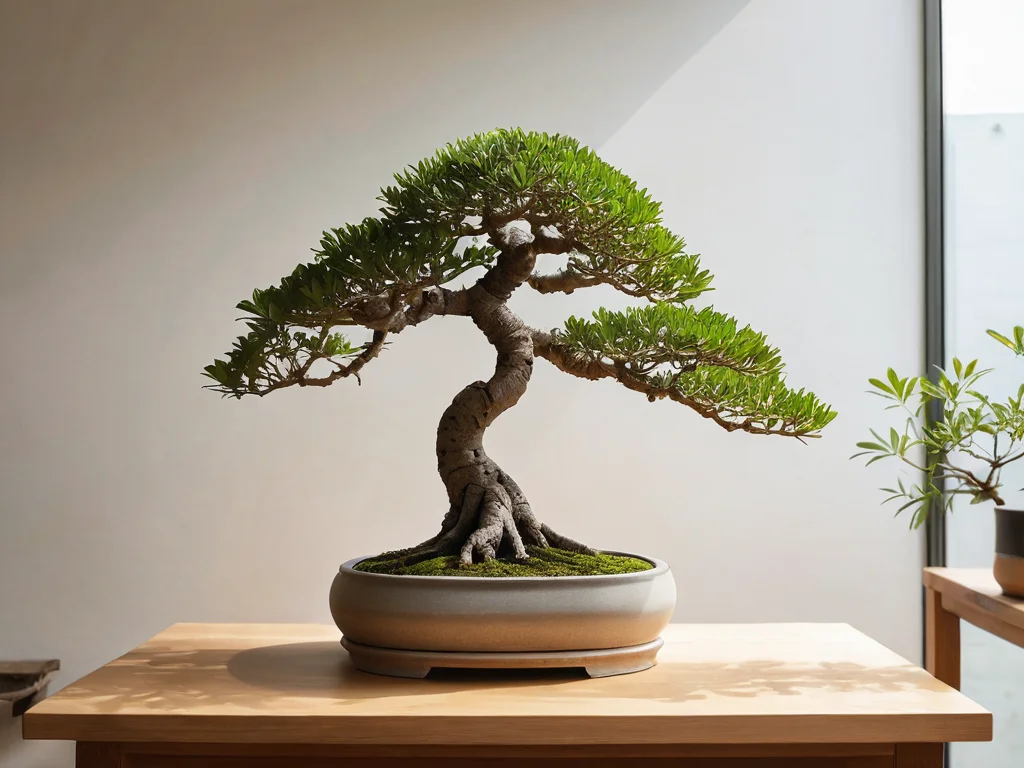For ages, humanity has strived for harmony with nature, understanding that it holds the key to well-being and spiritual balance. In the art of Feng Shui, this connection with natural elements is fundamental. Today, we delve into the amazing world of bonsai – a living symbol of this harmony, a miniature tree capable of transforming your home and filling it with powerful, auspicious energy.
Bonsai is not just a plant; it is a living work of art, created through careful shaping and care, which embodies the wisdom of ages and the power of nature. It is believed that each such tree, grown with love and attention, becomes a potent source of positive Qi energy, capable of influencing all aspects of our lives. In the context of Feng Shui, bonsai is more than just a decorative element; it is an active participant in shaping the energetic landscape of your space.
Bonsai and Feng Shui: How the Ancient Art of Miniature Trees Brings Harmony to Your Home
The art of bonsai has its roots in the ancient East, where philosophers and sages sought to comprehend the laws of nature by observing its grandeur and cyclical development. The creation of bonsai is an attempt to replicate the majesty of an old, mighty tree in miniature, to bring a piece of wild, untouched nature directly into your home. This process requires patience, a deep understanding of plant biology, and aesthetic vision.
In Feng Shui, every interior element plays a role in the movement of Qi energy. Plants, especially living trees, are considered powerful conductors of this energy. Bonsai, due to its miniature size and concentrated form, can become a true energetic anchor, focusing and directing Qi flows in your dwelling. It is a living object that constantly grows and changes, symbolizing life itself and its continuous development.
- Energy Concentration: The miniature form of bonsai allows it to concentrate the tree’s energy in a compact volume, making it ideal for small spaces.
- Living Connection with Nature: Even in the most urbanized apartment, bonsai serves as a reminder of nature, bringing its tranquility and stability.
- Symbol of Growth and Development: The continuous process of caring for and shaping bonsai reflects the life cycle, reminding us of the importance of constant development and self-improvement.
- Aesthetic Beauty: In addition to its energetic benefits, bonsai is an exquisite decorative element capable of adorning any interior and giving it a special atmosphere.
It is believed that the presence of bonsai in the home helps create a sense of peace and balance, reduces stress, and promotes deep relaxation. It is not just an interior item, but a form of meditation that teaches us patience and attention to detail day by day.
A Living Talisman: The Deep Symbolism of Bonsai in Feng Shui and Its Influence on Destiny
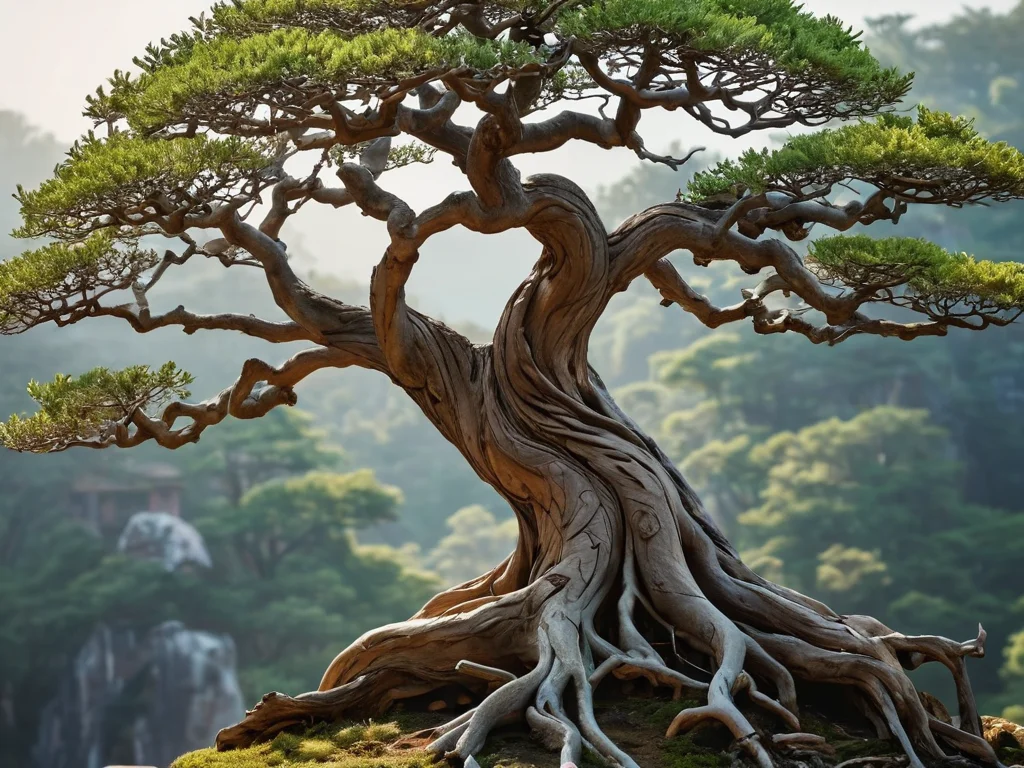
Bonsai in Feng Shui is not just decoration; it is a living talisman, carrying deep symbolism and exerting a powerful influence on the energetic field of the home and the destiny of its inhabitants. Every curve, every branch, and even the type of wood is imbued with its own special meaning, which weaves into the overall fabric of your well-being.
One of the key symbols associated with bonsai is longevity and wisdom. Many bonsai live for decades, and some for centuries, witnessing generations pass. This makes them a powerful symbol of a long and happy life, as well as accumulated experience and knowledge. It is believed that owning an old, well-developed bonsai contributes to gaining wisdom and insight.
In addition to longevity, bonsai also symbolizes resilience and vitality. A tree that survives and thrives in the limited space of a pot, shaping and adapting, becomes a metaphor for a person’s ability to overcome difficulties and remain strong in the face of adversity. It is a source of inspiration for those striving for personal growth and self-development.
Different types of bonsai carry their own unique symbolism:
- Pine and Juniper: Traditionally associated with longevity, strength, endurance, and the ability to withstand difficulties. They are believed to bring protection and safeguard the home.
- Ficus: Symbolizes abundance, prosperity, family happiness, and health. Its rounded leaves are associated with coins, attracting wealth.
- Maple: Embodies beauty, grace, and the ability to change and transform. It is believed that maple helps adapt to new conditions and find harmony in transitional states.
- Ash: A symbol of protection and healing, it is believed to have the ability to ward off negative energy.
- Bonsai with Flowers (e.g., Azalea, Carmona): Bring the energy of love, joy, good fortune, and new beginnings into the home. They also symbolize beauty and tenderness.
The shape of the bonsai also has significance. For example, a bonsai with an upright trunk (Chokkan) symbolizes stability and steadfastness, while the cascade style (Kengai) represents flexibility and adaptability to circumstances. It is believed that caring for bonsai helps develop these qualities in oneself, as you are literally shaping the energy of your future.
More Than Just Decor: How Bonsai Attracts Luck, Prosperity, and Health According to Feng Shui

Many people perceive bonsai solely as an object of aesthetic pleasure, a decorative element meant to adorn an interior. However, in the philosophy of Feng Shui, its role is significantly deeper. It is believed that bonsai is not just a static object, but a living energetic center capable of actively influencing Qi flows in your home, thereby attracting luck, prosperity, and robust health.
How does this happen? Let’s examine this mechanism from the perspective of Feng Shui:
- Attracting Luck Through Growth Energy: Bonsai, being a living plant, is constantly in a process of growth and development, albeit at a slow pace. This growth energy is associated with progress, new opportunities, and fortunate circumstances. When you care for a bonsai, you are literally cultivating the energy of luck and positive forward movement in your home. It is believed that a healthy, well-cared-for bonsai radiates powerful energy of auspicious development, which attracts good events into your life.
- Stimulating Prosperity Through the Wood Element: In the Feng Shui Five Elements cycle, the Wood element symbolizes growth, abundance, vitality, and, of course, prosperity. Bonsai, as an embodiment of this element, is an ideal activator of the wealth and abundance zones in your home. Its green foliage and sturdy trunk attract the energy of money and stable financial growth. The influence of ficus bonsai is considered particularly strong, with its round leaves resembling coins and traditionally associated with monetary luck.
- Strengthening Health and Vital Energy: The presence of living plants, in general, has a beneficial effect on air quality and, consequently, on our physical well-being. Bonsai, symbolizing resilience and longevity, is associated with robust health and endurance. It is believed that the energy emanating from a healthy bonsai contributes to strengthening the immune system, relieving stress, and maintaining overall vitality. The sight of a healthy, stable tree helps harmonize one’s inner state, bringing peace and confidence.
- Balance and Harmony: The art of bonsai aims to create perfect balance between all parts of the tree, its form, and the pot. This principle of balance and harmony projects onto the energy of your home. A balanced bonsai contributes to creating a balanced atmosphere in the room, where Qi energy flows smoothly, without stagnation or abrupt changes. Such harmony is the foundation for all types of well-being – from emotional to material.
Remember that for bonsai to bring maximum benefit, it must be healthy, well-cared-for, and placed in an appropriate location. Its living energy is a reflection of your care and attention.
Choosing the Ideal Bonsai: Secrets to Selecting “Your” Tree to Activate Desired Energies
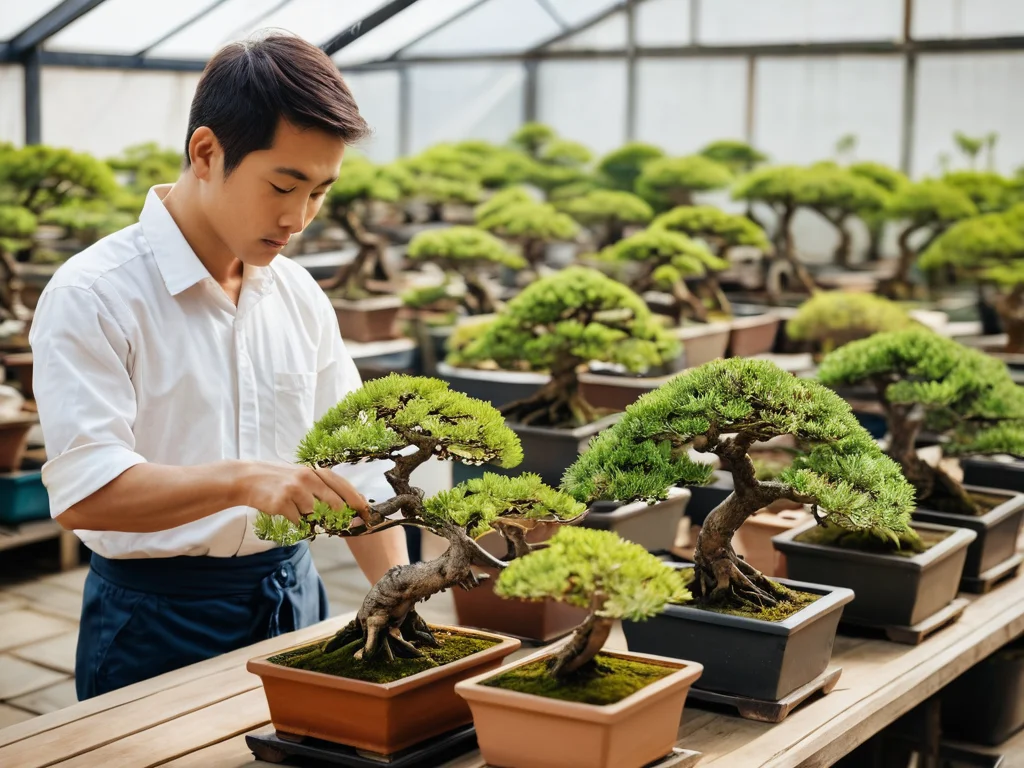
Choosing a bonsai is not just a trip to the store for a plant; it is a conscious step towards attracting specific energies into your life. For a bonsai to become a true helper in creating Feng Shui harmony, it is important to approach its selection with attention and understanding of its symbolism and energetic properties. It is believed that a correctly chosen tree will work in unison with your intentions and enhance the desired aspects of your life.
Here are the key aspects to consider when choosing “your” ideal bonsai:
- Define Your Intentions: Before choosing a tree, consider what energy you want to attract into your life. Are you seeking prosperity, health, longevity, family harmony, career success, or spiritual development? Your intention will be the guiding star in your choice.
- Choosing Bonsai Species by Symbolism:
- For Longevity and Wisdom: Look for bonsai made from pine or juniper. Their strength and ability to survive harsh conditions make them ideal symbols of a long and resilient life.
- For Prosperity and Abundance: Ficus, especially Ficus retusa (Chinese Banyan), with its dense foliage and strong trunk, is considered a powerful magnet for financial luck. Its round leaves resemble coins.
- For Family Harmony and Love: Bonsai with soft, rounded leaves, such as some species of maple or elm, contribute to creating a gentle and caring atmosphere. Flowering bonsai (e.g., azalea) can attract love and joy.
- For Career Growth and Development: Bonsai with a pronounced vertical growth or a strong trunk, such as some species of elm or hornbeam, can symbolize upward progress and success in business.
- For Protection and Purification: Some bonsai species, such as ash or acacia, are traditionally associated with protective properties, warding off negative energy.
- Plant Health and Vitality: Most importantly, choose only a healthy, strong bonsai. A wilted, yellowed, or sick plant will radiate weak or even negative energy. The leaves should be bright green (or the appropriate color for the species), the trunk firm, with no signs of pests. A healthy plant is the best conductor of positive Qi.
- Bonsai Form and Style:
- Upright Style (Chokkan): Symbolizes strength, stability, upward growth, ambition, and determination.
- Slanting Style (Shakan): Reflects flexibility, the ability to adapt to challenges while maintaining inner resilience.
- Cascade Style (Kengai) or Semi-Cascade (Han-Kengai): Symbolizes harmony with nature, the ability to bend with the wind without breaking, and a connection to descending energy flows, which can be beneficial for intuition and self-discovery.
- Multi-Trunk (Kabudachi) or Forest Styles (Yose-ue): Represent family unity, community, and harmony in relationships.
- Choosing the Pot: The pot also plays a role. Its color can correspond to the element of the Bagua zone (e.g., green or blue for East/Southeast – Wood, yellow/brown for Southwest/Northeast – Earth). The shape of the pot (round, square) also has its own meaning related to the elements. It is believed that pots of subdued, natural colors are suitable for bonsai, as they do not distract attention from the tree itself.
- Bonsai Age: Old, well-formed bonsai carry the energy of wisdom and longevity, while young ones can symbolize new beginnings and rapid growth.
Remember that choosing a bonsai is also a matter of personal intuition. If a particular tree evokes particularly pleasant feelings in you, it is likely perfectly suited for you and your home. Trust your feelings, and you will find your living companion of harmony.
Your Home as a Treasure Map: Where to Place Bonsai for Maximum Feng Shui Bagua Effect
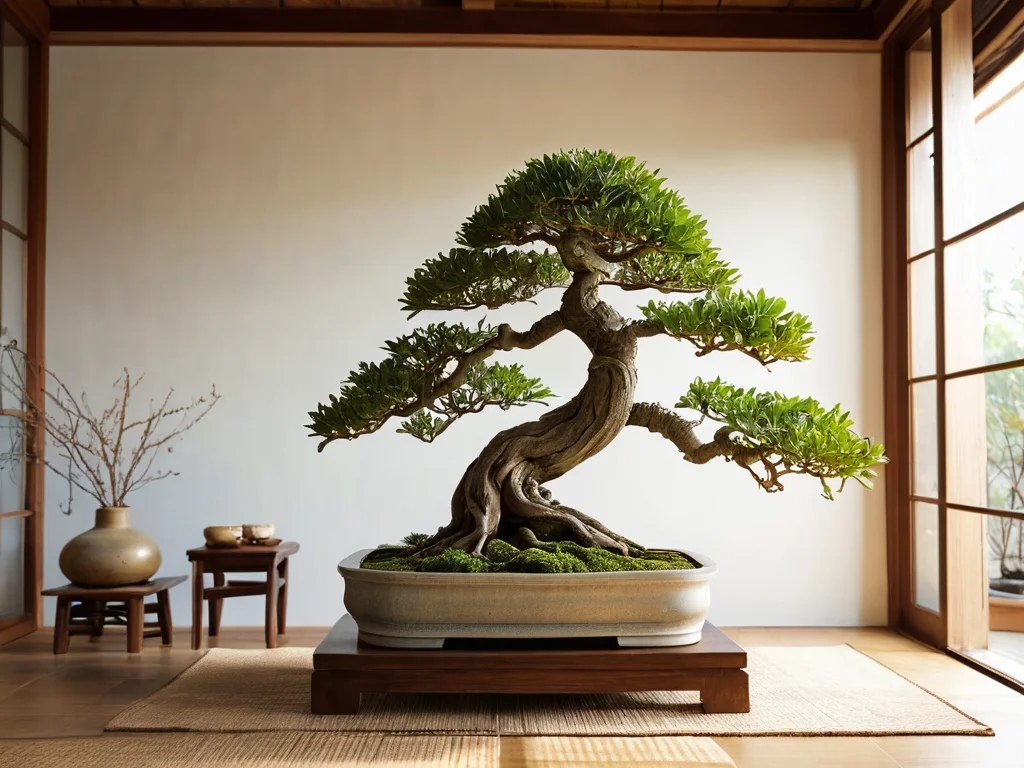
After you have chosen the ideal bonsai, the question arises: where should you place it to maximize its beneficial energy and synchronize it with the Qi flows in your home? The art of Feng Shui offers us a powerful tool – the Bagua map, which divides space into nine life areas. Correctly placing bonsai according to these zones can significantly enhance its positive influence.
Here’s how you can use bonsai to activate different Bagua zones:
- Wealth and Prosperity Zone (Southeast): This is perhaps one of the most popular zones for placing bonsai. The element of this zone is Wood. A bonsai, especially a strong and lush one, will be very fitting here. It is believed to stimulate financial growth, attract abundance, and help accumulate wealth. Choose bonsai with dense, healthy foliage, such as ficus, or fruiting ones (if possible). The pot color can be green, blue, or purple.
- Family and Health Zone (East): The element of this zone is also Wood. Placing bonsai here promotes strengthening family ties, harmonizing relationships, and improving the overall health of all household members. Choose bonsai that symbolize unity, such as those with multiple trunks or a forest composition. A green or blue pot will enhance the effect.
- Knowledge and Wisdom Zone (Northeast): The element of this zone is Earth, which nourishes Wood. A bonsai symbolizing longevity and wisdom, such as an old, well-formed pine or juniper bonsai, would look good here. It is believed to aid concentration, improve memory, and develop intuition. A pot in earthy tones (brown, beige) will be harmonious.
- Fame and Recognition Zone (South): The element of this zone is Fire. Although Wood nourishes Fire, caution is advised here. You can place a flowering bonsai with red or orange flowers, or a bonsai with bright autumn foliage (e.g., maple). It is believed this can help achieve public recognition and success. Avoid overly “watery” plants or blue pots, as Water extinguishes Fire.
- Love and Marriage Zone (Southwest): The element of this zone is Earth. To activate romantic relationships and harmony in marriage, you can use two small bonsai symbolizing unity, or one with rounded, soft leaf shapes. Flowering bonsai can bring tenderness and joy to relationships. Pots in pink, red, or earthy tones will be appropriate.
- Children and Creativity Zone (West): The element of this zone is Metal. Metal chops Wood, so delicacy is required here. If you want to place bonsai here, choose a tree with rounded leaves and place it in a metal or white pot. It is believed this can stimulate creativity and help with communication with children.
- Helpful People and Travel Zone (Northwest): The element is Metal. As in the West, caution is needed. If you still want to place bonsai here, choose a small, elegant plant in a white, gray, or metal pot. It is believed this can attract helpful people and facilitate travel.
- Career Zone (North): The element of this zone is Water. Wood depletes Water, so placing bonsai here is not always recommended, especially if it dominates. However, if you want to enhance career growth, you can choose a small, graceful tree in a black, blue, or glass pot, symbolizing smooth but steady ascent. The main thing is not to overload the zone with the Wood element.
- Center (Health and Overall Well-being): The element of this zone is Earth. A healthy, well-cared-for bonsai, placed in the center of the house or room, can be a powerful activator of overall well-being, supporting the balance and harmony of all life spheres. This is the place for your healthiest and most beautiful tree.
General Placement Recommendations:
- Avoid Bedrooms: It is believed that the active growth energy of bonsai can disrupt the peace necessary for sleep.
- Do Not Place in Bathrooms: These are zones of energy leakage, and bonsai can lose its strength.
- Ensure Sufficient Light: This is critically important for the plant’s health and, for Feng Shui, a symbol of clarity and vitality.
- Avoid Sharp Corners: Do not point sharp branches of bonsai towards relaxation areas or workspaces to avoid creating “secret arrows” of Sha Qi.
Attentive consideration of bonsai placement will transform it from a mere decoration into a powerful tool for harmonizing your living space.
Qi Energy Requires Care: Proper Bonsai Care to Preserve Its Strength and Benefits

As a Feng Shui Master, I always emphasize that a living plant is not just an interior item, but part of your energetic system. This is especially true for bonsai, which is the embodiment of concentrated life energy Qi. For your bonsai to truly bring luck, prosperity, and health, it needs meticulous and proper care. Caring for bonsai is not only a biological necessity but also a ritual that supports and enhances its energetic value.
It is believed that the condition of a bonsai directly reflects the energetic state of your home and even your personal well-being. A healthy, thriving tree radiates powerful, pure Qi, while a sick or neglected plant can attract stagnant or negative energy.
Here are the main aspects of bonsai care that support its energetic strength:
- Conscious Watering: Water your bonsai not just on a schedule, but with attention. Water is a symbol of wealth and energy flow. Proper watering, when you sense the plant’s need for water, not just by the clock, symbolizes your attentiveness to the needs of both your life and your home. Overwatering or underwatering leads to plant illness, and in Feng Shui, this signifies stagnation or energy leakage.
- Sufficient Lighting: Light is Yang energy, vitality, and clarity. Bonsai needs sufficient, but not always direct, sunlight, depending on the species. Placing bonsai in a well-lit area not only promotes its growth but also fills it with positive, active Qi. A dark, shaded spot weakens the bonsai’s energy and can attract Yin, stagnant energy.
- Regular Pruning and Shaping: Pruning is not just about aesthetic shaping; it is the process of “letting go” of the old and creating space for new growth. In Feng Shui, this symbolizes the ability to release the past, get rid of the unnecessary, and open oneself to new opportunities. It is believed that proper pruning helps maintain a balanced flow of Qi in the tree and, consequently, in your home. Removing dry and diseased branches is crucial to prevent stagnation of negative energy.
- Repotting and Soil Renewal: Periodic repotting of bonsai and soil renewal symbolize the cycle of renewal and rebirth. This is vital for the health of the root system and access to nutrients. Energetically, it signifies energy renewal, shedding accumulated negativity, and a surge of fresh strength.
- Fertilizing: Fertilizers are food for the bonsai, a symbol of support and care. Proper fertilization provides the tree with everything it needs for strong and healthy growth, which directly correlates with prosperity and well-being in your life.
- Pest and Disease Protection: Combating bonsai pests and diseases is analogous to cleansing your space of negative influences and obstacles. A healthy tree without parasites symbolizes purity and protection from external threats.
- Daily Attention and Meditation: Simply observing your bonsai daily, its condition, its reaction to light and water, can become a form of meditation. It helps you establish a deeper connection with nature and with yourself, enhancing intuition and inner harmony. It is believed that such conscious care for bonsai imbues it with your personal positive energy, making it an even more powerful talisman.
Remember that your bonsai is a living organism that responds to your care. The more love, attention, and proper care you give it, the more powerful and beneficial its energy will be for your home and your life.
Do No Harm: 7 Common Mistakes When Using Bonsai in Feng Shui and How to Avoid Them
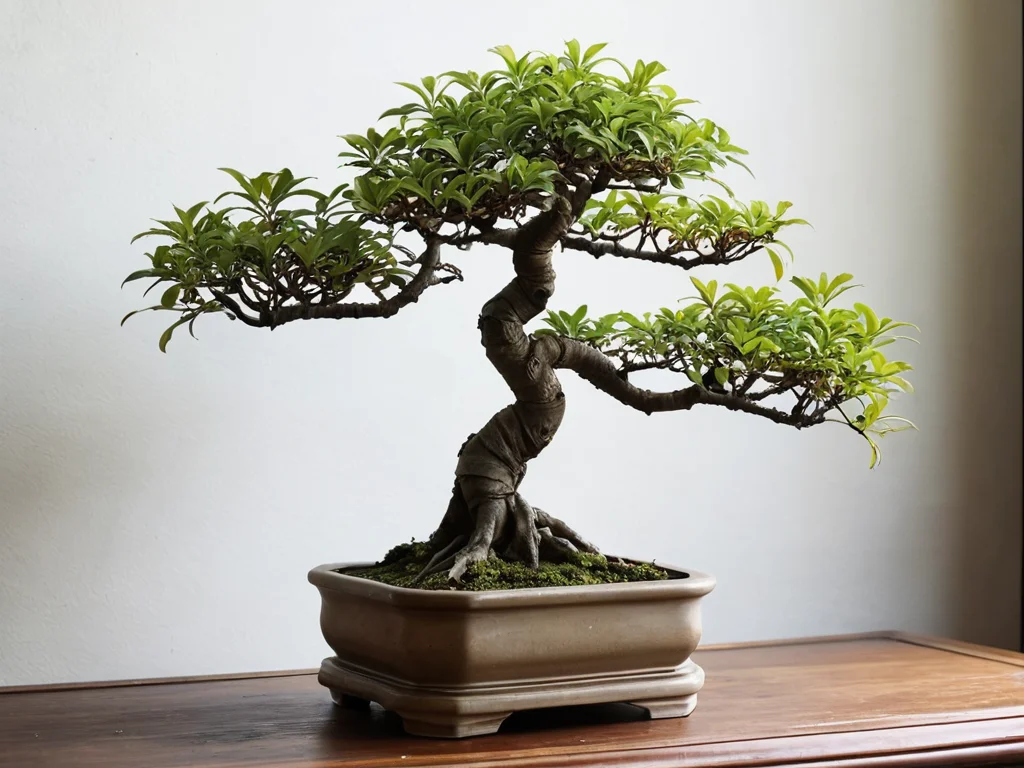
The art of Feng Shui is a science of harmony, and when working with living energetic objects like bonsai, it is crucial to follow certain rules to avoid disrupting the balance and, on the contrary, to enhance it. Although bonsai is a powerful source of positive energy, its incorrect use can lead to undesirable consequences. It is believed that any disharmony in your space can affect your life. Therefore, it is important to know and avoid common mistakes.
Here are 7 common mistakes when using bonsai in Feng Shui and tips on how to avoid them:
- Neglected or Sick Bonsai.
- Mistake: Allowing a bonsai to wilt, get sick, or die.
- Why it’s Bad: A sick or dead plant emits Sha Qi (negative, stagnant energy), which can attract misfortune, financial losses, and health deterioration. It symbolizes stagnation, decline, and destruction.
- How to Avoid: If your bonsai gets sick, make every effort to save it. If it cannot be saved, it is better to respectfully remove it from your home and replace it with a new, healthy plant. Regular and timely care (watering, fertilizing, pruning) is your main protection.
- Incorrect Placement of Bonsai.
- Mistake: Placing bonsai without considering the Bagua map or in unfavorable locations. For example, in a bedroom, bathroom, or hallway.
- Why it’s Bad: Bonsai, as a living source of energy, can disrupt the peace needed for sleep in a bedroom, bringing too active Yang energy. In the bathroom, its energy can be “washed away” or drained. In a hallway, it can block Qi flow.
- How to Avoid: Study the Bagua map of your home and place bonsai in zones corresponding to its symbolism and element. Avoid bedrooms, bathrooms, as well as narrow corridors and places where it will obstruct free movement.
- Excessive Number of Bonsai.
- Mistake: Placing too many bonsai in one room or throughout the entire house.
- Why it’s Bad: Although bonsai bring positive energy, an excess of them can create an overload of the Wood element, which can lead to imbalance and a feeling of “oversaturation” or “pressure.” Instead of harmony, a feeling of crampedness or excessive growth may arise, which is not always favorable.
- How to Avoid: The principle of “less is more” is very relevant here. Choose one or two well-placed bonsai that will become powerful accents and energy sources, rather than creating chaos.
- Using Artificial Bonsai.
- Mistake: Using plastic or silk imitations of bonsai as Feng Shui activators.
- Why it’s Bad: Artificial plants do not possess living Qi energy. They do not grow, breathe, or change, meaning they cannot bring living, dynamic energy into the home. At best, they are useless from a Feng Shui perspective; at worst, they collect dust and symbolize stagnation.
- How to Avoid: Always choose living bonsai. Only they can be true conductors and activators of energy.
- Bonsai with “Sharp” or Aggressive Forms.
- Mistake: Choosing bonsai with very sharp, thorny leaves or branches directed like “arrows” at resting or working areas.
- Why it’s Bad: Sharp forms can create Sha Qi, “secret arrows,” which cause tension, irritation, conflicts, or health problems, especially if directed at a person.
- How to Avoid: Preference should be given to bonsai with soft, rounded leaves and smooth, curved forms. If you have a bonsai with sharp branches, ensure they are not directed straight at places where you spend a lot of time.
- Mismatch in Bonsai Size and Room Size.
- Mistake: Placing a huge bonsai in a small room or, conversely, a tiny one in a spacious hall.
- Why it’s Bad: Disproportion disrupts the harmony of the space. Too large a bonsai can suppress the energy of the room and its inhabitants, creating a feeling of crampedness. Too small a one will get lost and cannot effectively activate the desired zones.
- How to Avoid: Choose a bonsai whose size corresponds to the size of the room and furniture. It should harmoniously fit into the overall composition, neither dominating nor getting lost.
- Ignoring the “History” or Previous Owner.
- Mistake: Acquiring a bonsai with an unknown history, possibly previously owned by people with a negative energetic background.
- Why it’s Bad: It is believed that living plants, especially long-lived ones like bonsai, can absorb the energy of their surroundings and their owners. If a bonsai grew in an unfavorable environment or with an unhappy person, it may carry that energy into your home.
- How to Avoid: If possible, buy bonsai from trusted, reputable sellers who care for their plants. If you have acquired a bonsai with an unknown history, perform a cleansing ritual: gently wash the leaves and pot, perhaps even repot it, imagining all negative energy leaving and pure Qi entering in its place.
- Neglected or Sick Bonsai.
Remember that Feng Shui is an art of mindfulness. Attention to detail and respect for the living energy of bonsai will help you avoid these mistakes and make your tree a true source of well-being.
Bonsai as Part of Your Life: Integrate Nature’s Wisdom for Lasting Well-being
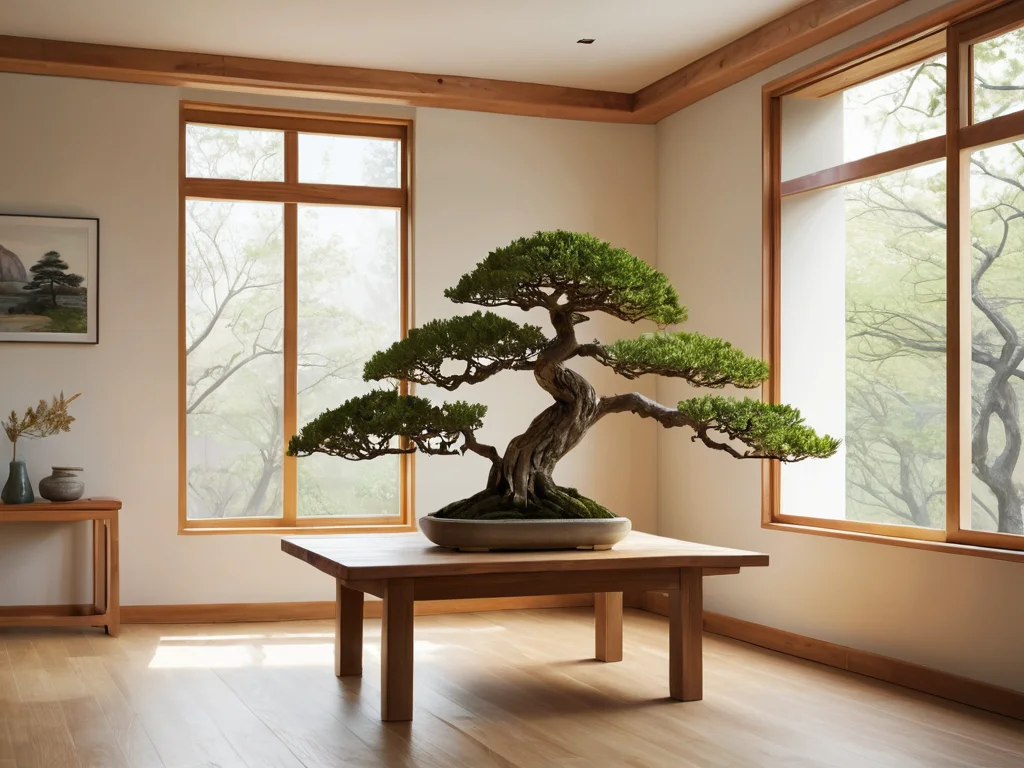
When we talk about bonsai in the context of Feng Shui, we are not just talking about a beautiful plant or a decorative element. We are talking about a living being that becomes part of your life, your silent teacher, and a source of constant harmony. Integrating the wisdom of nature, embodied in bonsai, into your daily life is a path to deep and sustainable well-being.
Your bonsai is more than just a tree; it is a mirror of your own soul and your attitude towards the world. How you care for it reflects your ability to care for yourself, your home, and your surroundings. It is a constant reminder of the cyclical nature of life, the importance of patience, and the beauty of growth and transformation.
- A Lesson in Patience and Consistency: Creating and maintaining a bonsai is a long process. It teaches us patience, the understanding that true greatness and beauty require time and consistent effort. These qualities are invaluable in your own life, whether in your career, relationships, or self-development.
- Symbol of Growth and Development: Your bonsai is constantly growing, albeit slowly. It symbolizes continuous development, forward movement, the ability to overcome limitations, and achieve new heights. It is believed to inspire you towards your own personal growth and striving for the better.
- A Reminder of Harmony with Nature: In a world where we are increasingly disconnected from nature, bonsai serves as a daily bridge to it. It brings a piece of the forest, mountains, or wild landscape into your home, reminding you of the need to live in harmony with the surrounding world and its rhythms. This connection with nature restores inner balance and peace.
- Meditation and Mindfulness: Daily care for bonsai, observing it, accepting its natural beauty and imperfections, can become a beautiful form of meditation. These are moments of mindfulness when you are fully immersed in the process, detached from the hustle and bustle. Such practices contribute to stress reduction, improved concentration, and the development of inner peace.
- Source of Positive Energy: A healthy, well-cared-for bonsai constantly radiates fresh, pure Qi energy. It fills your home with vitality, attracting luck, prosperity, and health. It is your personal living amulet that actively works for your well-being.
Do not perceive bonsai as a one-time investment in decor. It is considered a partner in your journey to harmony. Allow it to become part of your story, and you will see how its wisdom and energy will, step by step, transform your space and your life, bringing lasting well-being and joy.
